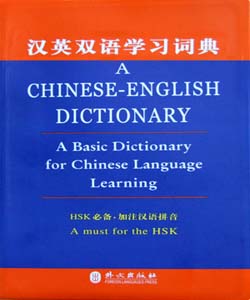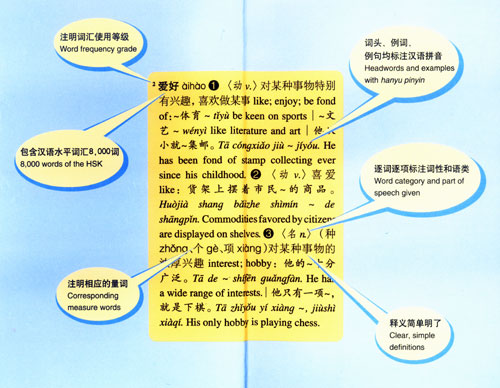Two editors-in-chief spoke exclusively to China.org.cn about their Chinese-English Dictionary, designed for foreign learners who wish to pass the "Han Yu Shui Ping Kao Shi" (HSK). The two editors explained the design and special features of the dictionary during the interview.
China.org.cn: Recently the Foreign Language Press published a new Chinese-English dictionary. Please explain why you decided to come out with this dictionary.
Wu Xunnan: More and more foreigners are now beginning to learn Chinese as the country enjoys consistently rapid economic growth, so it is quite necessary to publish a dictionary for foreign learners of Chinese, but it is also very time-consuming. We finalized this dictionary based on the standardized proficiency vocabulary for Chinese learners who wish to pass the Han Yu Shui Ping Kao Shi (HSK). We decided to include 8,000 essential words. All the dictionaries based on the proficiency vocabulary before this one are all Chinese ones in which only the prefixes are translated into English. This Chinese-English dictionary is the first one especially designed for foreign users.
China.org.cn: So this dictionary is very unique?
Qian Wangsi: Yes. Our new dictionary is based on the "Chinese proficiency vocabulary", plus all the first letters are arranged alphabetically, in Pinyin, with homophones arranged according to strokes and homophones with the same strokes ordered based on the first stroke.
In terms of paraphrase, explanation of basic knowledge is omitted because we assume that the foreign users already have this knowledge. For example, "eight" is paraphrased as "the result from adding seven to one" in most dictionaries, but this is apparently unnecessary for foreign learners. The word has been explained in this dictionary as "a Chinese figure, namely the Arabic numeral 8, the capital form of which can be written as '捌'".
Some explanation of the words related to Chinese culture has been made in the dictionary. For example, "The Creation of the World" - here we have briefly introduced the ancient Chinese myth of Pan Gu, who separated heaven and earth. We have also tried our best to introduce Chinese culture, history and geography via examples. For example, "Mt. Everest is the highest mountain in the world at 8844.43 meters above sea level." Additionally, to help users comprehensively understand each word, not only commonly used meanings but also dialectal meanings are included in the dictionary.
In addition, all the first letters, example words and sentences in this dictionary are marked with Pinyin, which is quite different from other dictionaries. We consulted with Mr. Zhou Youguang, a famous linguist, known as "the father of Pinyin", and also discussed this issue with many foreign friends, including other publishers. All of them think that Pinyin is the most convenient method for foreigners to learn Chinese. Foreign learners can read words based on Pinyin and they can also easily look up new words in dictionaries according to Pinyin.
Several parts of speech designated for a single character in the Chinese language are not easy for foreigners to grasp. Thus, parts of speech have been covered beside each word based on the Chinese dictionaries published in recent years.
Most of the quantifiers in Chinese have no counterparts in English and they have different usages on different occasions, making grammar more difficult for foreigners. Thus, words in this dictionary are accompanied by appropriate quantifiers that are ordered based on how they are used. In addition we mark Pinyin for each quantifier.
In brief, our market was the foreign reader from the very beginning. In fact, we have considered their needs from all angles and expended great efforts to compile a dictionary with these characteristics.
Wu Xunnan: I have two points to add to Mr. Qian's statement. The example sentences are vivid, which promotes flexible learning and usage. The dictionary also includes common idioms, proverbs and slang in order to assist learners in gaining more Chinese vocabulary words. Also, the dictionary gives explanations for words that are literally difficult to understand.
Finally, I want to introduce the editors and translators. Most of them are senior editors and translators engaged in international communication as well as our professional staff who compile dictionaries and teaching books in foreign languages. Many of them know several foreign languages and they are familiar with cultural differences as well as the readers' needs and perceptions. The editors and designers are also good at cross thinking and have expended great efforts to make this dictionary target foreign users.
China.org.cn: That is great to hear. Thank you for your time.
Wu Xunnan: Thank you. I hope more foreigners will get to know this dictionary and use it when studying the Chinese language.
(China.org.cn by Yang Xi, December 18, 2007)



